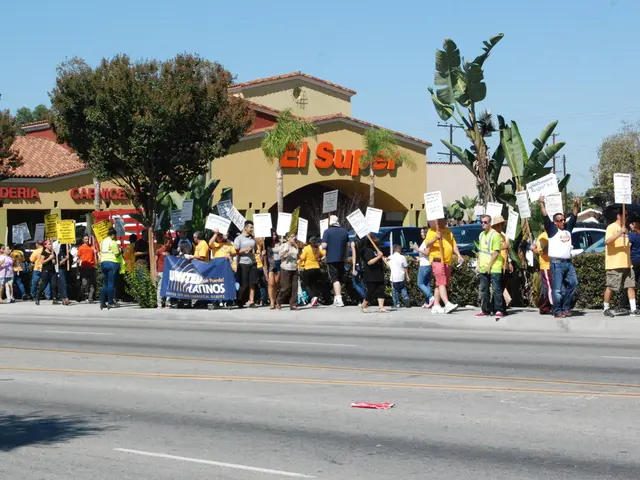Criticism Levied on Proposed West Bank Settlements by the U.S. Administration
In the West Bank, tensions have escalated following attacks by radical settlers on Palestinian communities. Settlers in Atara reportedly threw firebombs at houses and cars, with such attacks often going unpunished.
The international community has expressed strong disapproval of these actions, as well as the Israeli settlement plans for the E1 area. This region is considered one of the most sensitive points in the ongoing conflict, as its development would effectively divide the West Bank into a northern and southern part.
The European Union (EU) and Turkey have been vocal in their criticisms, stating that such unilateral decisions exacerbate the already tense situation and further undermine any possibility of peace. The EU foreign policy chief, Josep Borrell, has emphasised that settlement expansion, including moves into the E1 area and other parts of the West Bank, are steps toward de facto annexation and a fundamental breach of agreements such as the Oslo Accords.
The international legal consensus holds Israeli settlements in the West Bank, including the E1 area, to be illegal under international law. These settlements are considered a violation of the Fourth Geneva Convention, which prohibits an occupying power from transferring its civilian population into occupied territory. This view is reaffirmed by the International Court of Justice (ICJ) in its July 2024 Advisory Opinion and supported by numerous UN resolutions condemning settlement activity.
The E1 area settlement plan, approved by Israel in August 2025, is widely condemned as an unlawful step to annex occupied territory. This plan threatens the territorial contiguity of the West Bank, undermines the feasibility of a future Palestinian state, and risks forced displacement of Palestinian Bedouin communities. The UN Secretary-General has urged Israel to halt all settlement activity immediately, stating that these settlements run counter to UN resolutions and international law.
Germany, as an EU member state, aligns with the EU’s stance condemning settlement activity. It considers settlements illegal and a threat to the two-state solution, consistent with broader EU policy. Turkey, while not detailed specifically in the recent documents provided, has historically condemned Israeli settlements as illegal and a violation of Palestinian rights, aligning with the majority of UN member states’ views that settlements contravene international law.
Israeli Finance Minister Bezalel Smotrich has announced plans to build around 3,400 housing units in the E1 area between East Jerusalem and the Maale Adumim settlement. Smotrich has also threatened to annex the West Bank if a Palestinian state is recognised next month. These actions have been met with criticism from the international community, with the German government calling on the Israeli government to stop settlement construction and only recognising border changes made by the parties to the conflict.
The development of the E1 area would separate the West Bank from East Jerusalem, which is considered a violation of international law and UN resolutions by both the European Union and Turkey. The territorial integrity of the State of Palestine, which is the basis for a two-state solution and the hope for lasting peace, is undermined by the Israeli settlement plans in the E1 area, according to Turkey.
More than 700,000 settlers live among around three million Palestinians in the West Bank and East Jerusalem, areas occupied by Israel during the 1967 Six-Day War. The international community continues to call for a peaceful resolution to this long-standing conflict, with the overwhelming international legal position being that Israeli settlements in the West Bank, including E1, are illegal and obstruct peace efforts.
[1] "International Court of Justice Advisory Opinion on the Legal Consequences of the Construction of a Wall in the Occupied Palestinian Territory" (2004) [2] "UN Security Council Resolution 2334 (2016)" [3] "UN General Assembly Resolution ES-10/19 (2003)" [4] "European Union Guidelines on the Promotion and Protection of Human Rights" (2020)
- The international community, including the European Union and Turkey, strongly condemn the proposed development of the E1 area, as it goes against international law and UN resolutions, posing a significant obstacle to peace efforts.
- Israeli policy and legislation, such as the approval for building 3,400 housing units in the E1 area, are repeatedly criticized for exacerbating war-and-conflicts and undermining the territorial integrity of the State of Palestine, which is central to a two-state solution.
- Crime-and-justice and politics intertwine in the ongoing dispute over the West Bank as the international community consistently expresses disapproval for Israeli actions related to migration, including the settlement of civilians in the E1 area, viewing it as a fundamental breach of Geneva Convention rules, undermining the hope for lasting peace.







